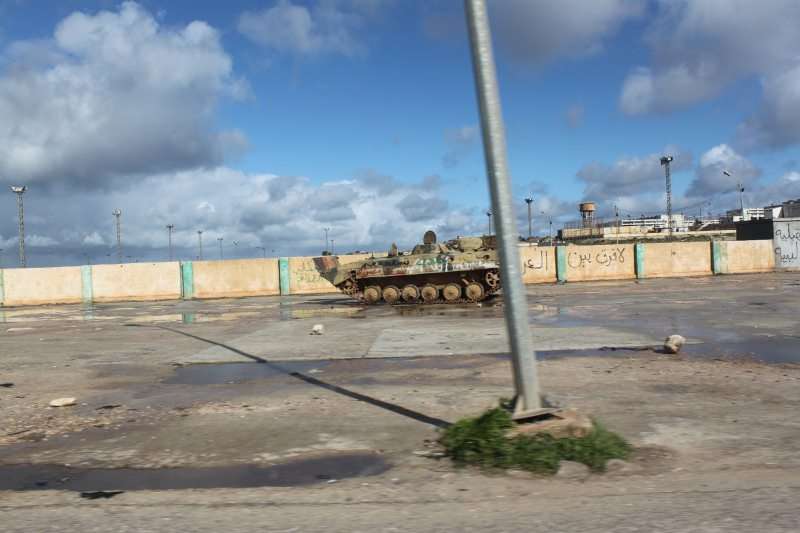Finding the Truth at Benghazi
Here comes Watergate, 21st-century style-except this time around, innocent people died.


When the White House, in response to a Freedom of Information Act (FOIA) request filed by the fearless private watchdog group Judicial Watch, turned over an email about constructing the appropriate narrative response to the tragedy at Benghazi written by Ben Rhodes, a deputy national security adviser to President Obama, and investigators from the House of Representatives realized that they had subpoenaed that email and not received it, they knew that there was far more to learn about the affair than met the eye.
The affair consisted of an organized, fatal assault on the American consulate in that Libyan city that resulted in the deaths of the American ambassador and three State Department contractors assigned to protect him. It also includes a White House-orchestrated cover-up involving profoundly misleading statements after the attack, followed by an only-in-Washington cover-up of the cover-up.
The attack on the consulate occurred on Sept. 11, 2012, the 11th anniversary of 9/11, just as the American presidential election campaign between Barack Obama and Gov. Mitt Romney was getting under way. Two weeks prior to the attack, Obama had assured his political supporters for the hundredth time that al-Qaida was on the run, its leadership had been subdued, and that he was the cause of that. The last thing his campaign managers wanted to confront in the middle of September was an al-Qaida-orchestrated attack on American property in the Middle East in which our ambassador was murdered.
Yet, that's what confronted the Obama campaign managers. So, they concocted a narrative that they could comfortably live with and that they believed the American public would accept. Susan Rice, then the U.S. ambassador to the United Nations, relayed the narrative. Rice either permitted herself to become a political tool or materially lied to the American public when she told five Sunday morning talk shows on Sept. 16, 2012, that the attacks in Benghazi were not acts of terror and were not aimed at the ambassador, but rather were the spontaneous and unplanned reaction of a street crowd to a cheap, anti-Muslim Internet clip that some jerk in California had made earlier that summer.
For a while, this seemed successful. The president was able to continue misleading the electorate with his claim that al-Qaida was on the run, Secretary of State Hillary Clinton was able to distance herself from the failure of her State Department to protect its own employees, and Romney and the Republicans would not discover the truth, or at least would not develop a narrative sufficient to contradict the White House narrative, until after the election.
It worked.
Now, with the discovery of the Rhodes email, it appears that the White House did use the instruments of government to aid the president's re-election campaign by deceiving the American people and telegraphing that proposed deception to the president's campaign officials. Using government personnel and assets to coordinate a political campaign, even if done truthfully and above board, violates federal criminal statutes.
As if that were not bad enough, it now appears that the State Department had special operations forces in close proximity to Benghazi, and the White House ordered them to stand down rather than confront the attackers, meet force with force, and endeavor to save the lives of the ambassador and others, though at the risk of contradicting the president's political boast.
When the truth—that the Benghazi attack was an al-Qaida-organized assault complete with military hardware and sophisticated planning—became known, and when the apparent deception by the president, the White House, and the State Department was discovered, Republicans were furious.
Then the cover-up of the cover-up began, as the House Committee on Oversight and Government Reform learned when it tried to determine who told the U.S. forces to stand down, who dispatched Rice to tell lies, who certified that the Rhodes email did not exist, and who then eventually released it. The committee wanted to know whether Rice was duped or was part of a plot to use the instruments of government to lie and deceive and enhance Obama's chances of defeating Romney.
So, the Oversight Committee issued subpoenas and held hearings and concluded—a conclusion with which even the Democrats now agree—that the Benghazi attack was part of an organized terrorist assault, and the consulate was undefended.
Then Judicial Watch revealed the reply to its FOIA request of the White House, which included the Rhodes email, and a political firestorm broke loose. Speaker John Boehner addressed that firestorm by asking the House to form a Select Committee—one whose sole goal is to get to the bottom of this—and to grant it a serious budget and a full legal and investigative staff, and to set it loose upon the administration's deceivers.
Already, the administration has declared that many of the documents the Select Committee will seek have been classified as top secret, and the president is free to classify any document he wants for any reason he chooses. Legally, that argument is correct. Frustrated congressional Republicans have no one to blame but themselves here, as they gave that legal power to President George W. Bush.
Nevertheless, can the Select Committee subpoena the president and his records to find out where he was during the eight-hour attack, who gave the order to stand down and permit murder rather than suffer political embarrassment, and who concocted the Rice deceptions? Yes. And he will claim executive privilege, and a federal judge will make the call.
And so, here comes Watergate, 21st-century style—except this time around, innocent people died. This time around, will it have the same outcome?


Show Comments (219)